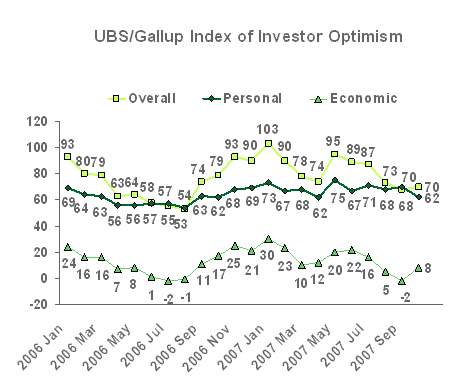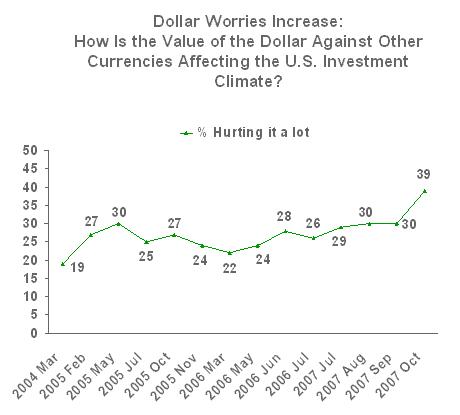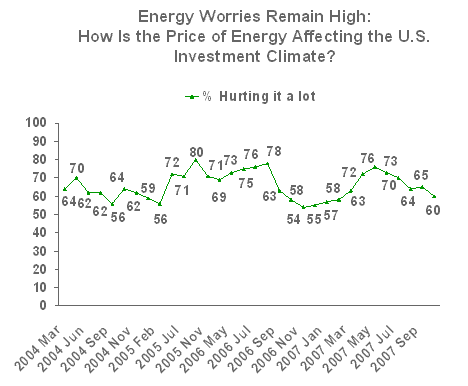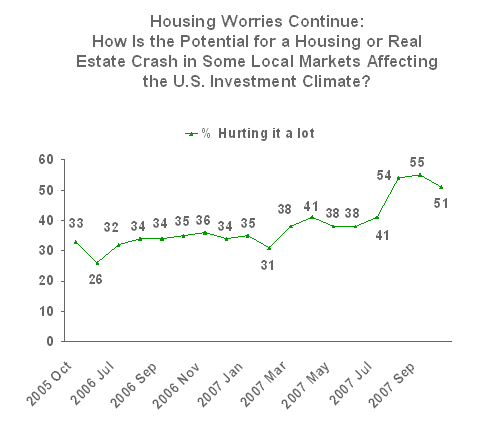PRINCETON , NJ -- The Fed's action in reducing interest rates and early October's somewhat more positive monthly employment report seem to have moderated investor concerns about the future course of the U.S. economy, according to the new UBS/���۴�ýIndex of Investor Optimism poll. Still, investors are less optimistic about their investment portfolios and more worried about the value of the dollar. Investors also seem to agree with the concerns that Treasury Secretary Paulson and Fed Chairman Bernanke expressed last week about the continued deterioration in the nation's residential real estate markets.
Given these concerns, it is not surprising that about one in four investors say they intend to spend less this holiday season. Add in the record price of oil and it seems reasonable to assume that retailers -- including those who serve middle- and upper-income consumers -- have significant reasons to worry about the holiday sales season.
Investor Portfolio Expectations Tumble
Investor optimism overall remained at its lowest levels of the year in October, according to the new UBS/���۴�ýpoll. The Index of Investor Optimism now stands at 70 -- essentially the same as September's 68. During the past two months, the Index has been at its lowest levels since August 2006, when it stood at 53. The Index is conducted monthly and had a baseline score of 124 when it was established in October 1996.
Although the overall Index remained flat, its composition changed significantly. The Economic Dimension of the Index, which measures investors' feelings about the direction of the overall U.S. economy, improved 10 points, from -2 in September to +8 in October. This suggests that the Fed's cut in interest rates and early October's more positive monthly unemployment report made investors somewhat more optimistic about the future direction of the U.S. economy.
In sharp contrast, investors' optimism about their individual investment portfolios fell in October, as the Personal Dimension of the Index tumbled 8 points to 62 from 70 in September. This matches the 2007 low point for investors' optimism about their own portfolios, recorded in April. It also suggests that many investors may not be as confident as they were a month ago that the equity markets can continue to do well even as the overall U.S. economy slows.

More Investors Worry About the Dollar
Most of the time, U.S. investors seem relatively unconcerned about the value of the dollar. The plunge in the dollar this year, however, has a growing number of investors worried: the percentage saying the value of the dollar is hurting the investment climate "a lot" hit 39% in October. This is the highest level of concern registered about the value of the dollar since monitoring began in March 2004.

Energy Concerns Remain High
With oil prices exceeding $80 a barrel, it is not surprising that energy prices remain the top concern of investors. Still, the percentage of investors saying energy prices are hurting the economy "a lot" fell to 60% in October from September's 65%. Most likely, this results from the fact that record oil prices have yet to be reflected at the gas pump.

No Bottom in Housing Decline
Housing and real estate worries remain second only to energy prices as an investor concern in October (though they effectively tie for second with concerns about the federal budget deficit). Fifty-one percent of investors say they believe the potential for a housing or real estate crash in some local markets is hurting the investment climate "a lot." This is down from the 55% who felt this way in September but is a sharp jump from the 41% who felt this way as recently as July.
Investors continue to indicate that there is no bottom in sight for the housing and real estate markets, with 78% saying they believe economic conditions in the national residential real estate market are getting worse in October -- down slightly from the 81% who felt this way in September. But local real estate markets are worsening -- 63% say economic conditions in their local real estate markets are getting worse, similar to the 65% who felt this way in September, and one of the highest readings of the past year.

Retailers Have Reason to Worry
Forty-three percent of investors now believe the consumer credit crunch is hurting the economy "a lot." Investors also seem to feel that the credit crunch is continuing to squeeze consumers, with 65% saying it is harder for Americans to get credit now than it was three months ago. Given the loan write-downs reported by many of the nation's biggest banks last week, it is hard to see how the consumer credit squeeze is going to get much better in the months ahead.
Making the outlook even worse for the upcoming holiday season is the record level of oil prices that have yet to filter through to the average American's gas pump. A surge in gas prices at the pump is likely to intensify the potential consumer spending pullback as the year comes to a close. In this regard, it is not surprising that 27% of investors say they will spend less this holiday season than last, compared with 24% who said they would spend less the last time this was measured, in November 2005.
Obviously, the nation's retailers have good reason to worry about their holiday sales. What may make 2007 different is that the pain of this consumer pullback that has mostly been a problem for lower-end retailers in recent years may also be felt by middle and upper-end retailers this holiday season. While gas prices tend to hurt lower- and moderate-income consumers the most, the housing depression and the credit crunch will tend to have a greater impact on middle- and upper-income consumers.
Survey Methods
Investor results are based on telephone interviews with 804 investors, aged 18 and older, conducted Oct. 1-14, 2007. for results based on the total sample of investors, one can say with 95% confidence that the maximum margin of sampling error is ±4 percentage points. In addition to sampling error, question wording and practical difficulties in conducting surveys can introduce error or bias into the findings of public opinion polls.
